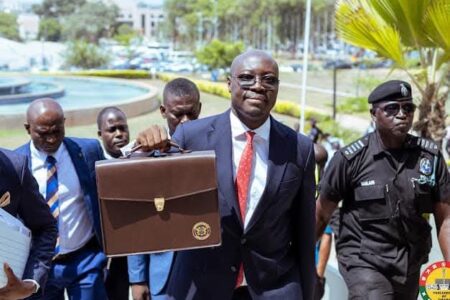Ghana’s energy sector is facing a dire financial crisis, with the government set to pay a staggering $1.1 billion to ENI in 2025 alone.
This payment covers monthly invoices, letter of credit (LC) replenishments, and outstanding arrears—an obligation Finance Minister Dr. Cassiel Ato Baah Forson attributes to years of neglect and poor financial management.
Dr. Ato Forson did not mince words when addressing the issue, stating, “For far too long, critical obligations were pushed aside, leaving us with a broken system that now demands urgent and painful corrections.”
He placed blame on previous administrations for failing to tackle the accumulating energy sector debts, ultimately pushing the country into a financial corner.
The consequences of this inaction are now evident. Ghana’s energy sector is bleeding financially, and the government is left with no choice but to divert funds that could have been used for vital sectors like healthcare, education, and infrastructure to cover these obligations.
The Finance Minister painted a grim picture of the monthly financial shortfalls within the sector. Ghana’s total monthly energy costs amount to a staggering 2.5 billion cedis, with fuel and power generation alone consuming 1.9 billion cedis.
Yet, the Electricity Company of Ghana (ECG) manages to collect only 1.3 billion cedis, leaving a shortfall of 1.2 billion cedis every month.
With such a deficit, the sustainability of Ghana’s energy sector is in serious question.
Dr. Forson further revealed that government is now scrambling to find solutions to ensure that the country does not plunge further into debt while keeping the lights on.
He again revealed that at a recent meeting with ENI officials, he made it clear that Ghana has no choice but to meet these financial obligations.
“We are left with no choice but to find the money that could have been used for other worthwhile pursuits like development, healthcare, and education to pay for commitments that should have been honoured years ago.”
He later assured Ghanaians that his ministry is determined to stabilize the sector.
Despite the burden inherited, he emphasized the government’s commitment to clearing the debts and preventing further deterioration of the country’s energy infrastructure.
IMF Program and Power Sector Reforms
During a meeting with U.S. Ambassador to Ghana, Virginia Palmer, Dr. Forson admitted that Ghana has encountered challenges in fully implementing its International Monetary Fund (IMF) program.
energy crisis
Power Plant
However, he reaffirmed his administration’s unwavering commitment to making the necessary policy adjustments and structural reforms to ensure the country remains on course with the program’s objectives.
According to him, concrete measures are being taken to settle these debts in a sustainable manner, as ensuring the stability of the energy sector remains a top priority for the administration.
“We have also successfully streamlined the implementation of the Cash Waterfall Mechanism, ensuring that arrears will no longer accumulate. Additionally, we are in the process of renegotiating power purchase agreements, which will be submitted to Parliament for approval.”
These measures, according to Dr. Forson, are critical to ensuring Ghana’s long-term energy security and financial stability.
The goal is to create a framework where energy production and distribution are financially sustainable without placing an undue burden on taxpayers.
Source: puredecadeonline.com

